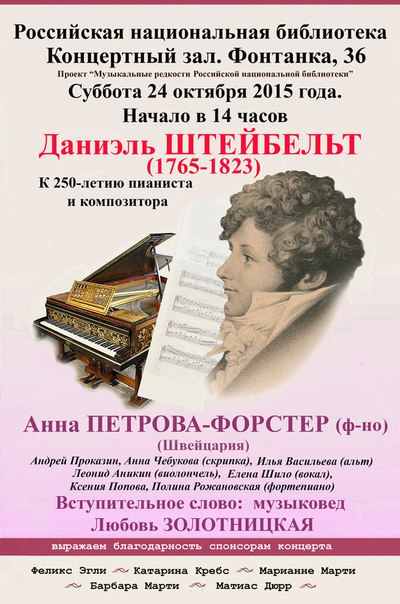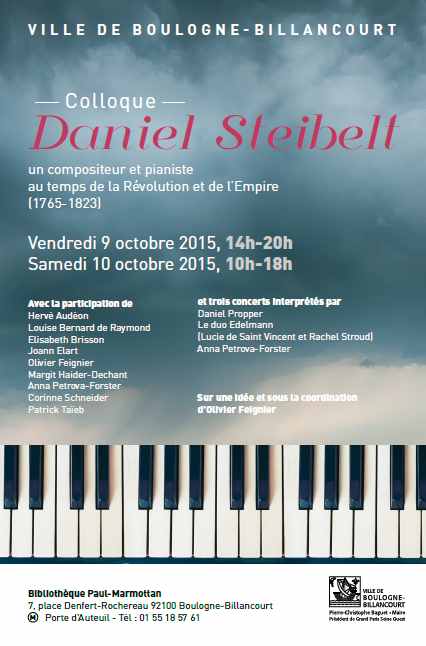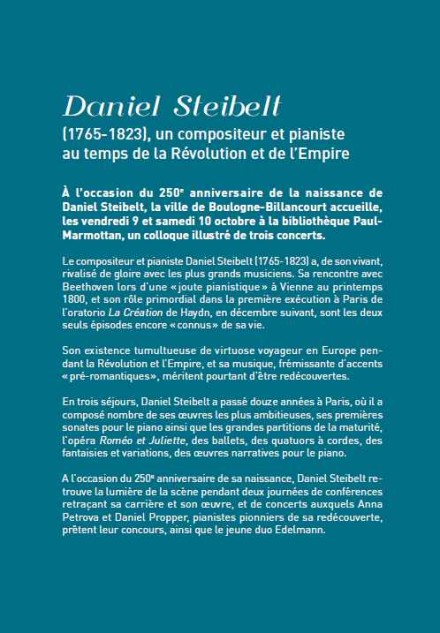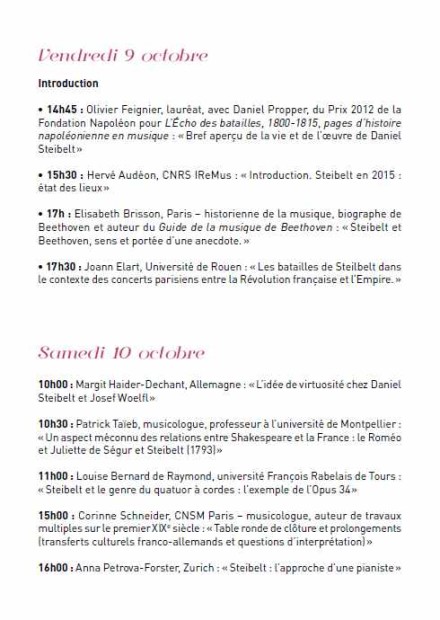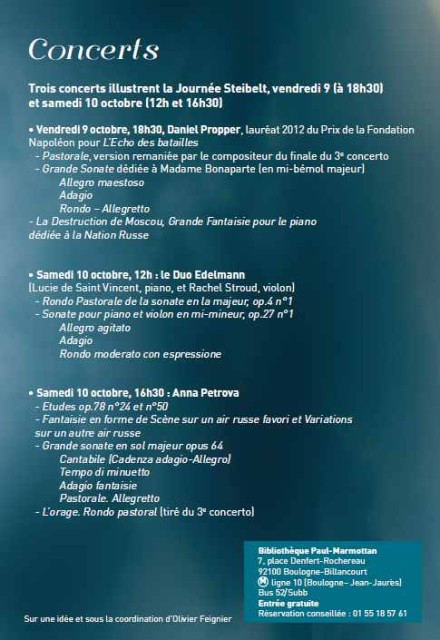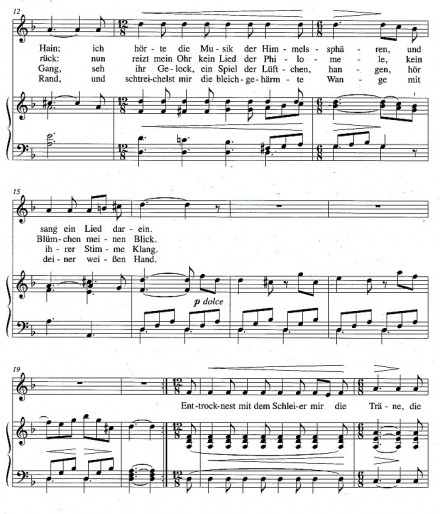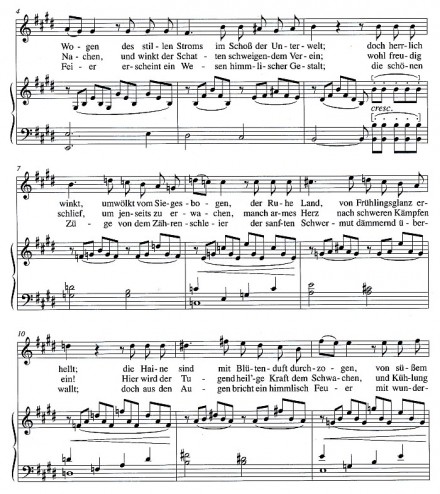New! Unisex Piano!
Did you ever dream to have an exclusive unisex piano with a fantastically modern keyboard design? Now it can be yours, do not miss it.
Renk: Beyaz,Siyah,Kırmızı,Kahverengi,Turuncu
means
Colour: White, Black, Red, Brown, Orange
and
Cinsiyet: Üniseks
means
Gender: Unisex
Is it a such piano that this music lover is playing?
Not for the faint-hearted.
[youtube]https://www.youtube.com/watch?v=URlP82DDAf0[/youtube]
Daniel Steibelt (1765-1823) Piano Works CD
Dear friends, dear music lovers,
I would like to present my new compact disc, dedicated to Daniel Steibelt (1765-1823). You will find more information on the Daniel Steibelt CD page!
The Forgotten: Janos Fusz or Johann Fuss (1777-1819)
As I continue to be interested in less known or forgotten composers of the end of the 18th, beginning of the 19th centuries, I try to listen to every possible recording. Lately it was the music of Janos Fusz (or Johann Fuss), a German composer born in Hungary in 1777 that highly impressed me. His compositions include songs, piano works, chamber music and stage works. There are 2 CDs on the market – the one of them dedicated to his piano music played by Aniko Horvath, the other (the only existing recording of the songs) is made by Maria Zadori (soprano), Timothy Bentch (tenor) and Aniko Horvath (fortepiano), with a booklet written by Zoltan Farkas (rec. October 2005, HUNGAROTON HCD32404). Composed between 1809 and 1818, these songs are wonderful examples of early romantic pieces for voice and piano. For example “An Minnas Geist” op.6 is written in 1808:
or “Elysium”, created in 1816:
Of course I wanted to know more about the author. While searching I came across the CD’s review (by Robert Hugill).
Well, it is more likely a sort of review as Mr. Hugill simply paraphrases the booklet – but it is so little known about Fusz that it is quite understandable. However, cutting the phrases and changing the meaning according to the own needs is not a proceeding I admire much. Here are some examples (the emphasis in bold is mine):
Z. Farkas: “The Hungarian musical scene of the 18th and the early 19th centuries is populated with so-called Kleinmeister (minor masters)”.
R. Hugill: “Fusz was very much a minor master, one of many on the Hungarian musical scene”.
It is a fashion to call minor all the unknown, forgotten composers. It also means that about 70-80 years ago Schubert too was a minor composer who progressively climbed the hierarchical stairs. Therefore, there is always a hope to become a star, especially posthumously.
Z. Farkas continues:”if the diary of the Czech composer Vaclav Jan Tomasek is to be trusted, Beethoven made some remarks about his colleague in Hungary. As a matter of fact, it is a dubious glory since Beethoven spoke about Fusz In November 1814 as follows: “He has no idea of instrumental music. He understands songs and should stick to it.” Further Farkas explains why so: “To throw light on this remark it is essential to know that Beethoven whose fame and popularity were on the rise in Vienna in those days looked upon Fusz as his rival. One of his numerous discarded opera schemes was to set to music G. F. Treischke’s libretto Romulus and Remus. To his annoyance, he found out that Fusz had already completed his great heroic opera in three acts, written to the same libretto. As is well-known, Beethoven never composed his own Romulus but the conflict made it impossible for Fusz as well to have his opera performed in Vienna. In point of fact, Beethoven’s concern is indicative of the Hungarian composer’s supreme skill in writing for singing voice.”
Hugill’s interpretation: “Composer Janos Fusz’s main claim to fame seems to be that he came to Beethoven’s notice, albeit in unfavourable circumstances. Czech composer Vaclav Jan Tomasek’s diary records that Beethoven made some disparaging remarks about Fusz. At the time, Beethoven had been hoping to bring to fruition his scheme for his opera ‘Romulus and Remus’ but this was frustrated by the fact that Fusz had already written an opera on the subject. Needless to say, Beethoven saw to it that Fusz’s opera was never performed in Vienna.”
As Z. F. writes correctly – if Tomasek’s diary is to be trusted (we have to point out that no name is cited in the dialog written by Tomasek, there is only a *** instead of a name). Until today, it is a simple assumption that they both talk about Fusz. What strikes me most is that Tomasek’s nasty comments about any forgotten composer (sorry, minor!) have always been happily quoted, while his critics on Beethoven, Haydn or Weber are carefully ignored. WHY?
Z. F.: “In 1804 he (Fusz) improves his knowledge of music studying with Georg Albrechtsberger in Vienna, the most famous teacher of composition of the time who regarded Fusz as one of his favourite pupils.”
R. H.: “In 1804 he went to study with Albrechtsburger in Vienna. Albrechtsburger was one of the most famous composition teachers of the time and he regarded Fusz as one of his favourite pupils.”
Of course it is Albrechtsberger, but never mind; he is a minor composer, too.
Z. F. “In connection with the relationship between the great Viennese masters and Fusz two names should be named. On the evidence of his works he must have been familiar with Mozart’s operas; the only surviving fragment of Romulus und Remus, a canonic trio was inspired by the famous canon in A flat major of the finale of the second act of Cosi fan tutte. On the other hand, his vicissitudinary career, the hard life of a musician trying to create an existence on his own as well as his love for small lyrical forms – songs in the first place – make him related with Schubert. While Fusz cannot probably have heard Schubert’s early works, the contrary is not impossible: the young Schubert may have been familiar with the Hungarian composer’s works who had several sets of songs published.”
R. H. “translates” it thus:”Only one fragment of Fusz’s Romulus and Remus survives and this, a canonic trio, seems to have been inspired by the canon in the finale of Act 2 of Cosi van tutte; we thus have good grounds for presuming that Fusz knew Mozart’s operas. It is the spirit of Mozart that hovers over the songs on this new disc. Fusz’s published works were possibly known to Schubert, but Fusz never really reaches the complexity of Schubert.”
Mr. Hugill is too kind – Fusz does not reach (must he?) either the complexity of Schubert (like in Schubert’s “Little Rose of the Field” (Heidenröslein) for example?), nor these of Schumann or Brahms. Yet if you listen to the CD you will certainly find a complexity – right, that of Fusz.
It should be clear that Fusz knew the operas of Mozart as well as the operas of Salieri or Martin y Soler or many other composers in Vienna. Still I had no chance to find any spirit of Mozart in Fusz’s music. However, while Timothy Bentch’s singing style fits perfectly into the period, Maria Zadori’s (who is a baroque singer) interpretation sometimes tends to lead us back to the past. Especially as the instrument used here is a Walter piano (copy) of 1795. The gap of almost 20 years between the instrument and some of the compositions (1809-1818) is enormous for this period. That is the only whiff of 18th century in this CD. Interestingly enough, the same piano alone is convincing in the recording of Fusz’s piano works.
In the end R. Hugill concludes:”Fusz’s songs are by no means masterpieces but the least of them is charming and the best are fascinating in their attempts to extend the form, within the composer’s limits.”
In contrary to his statement, in my humble opinion Fusz’s songs ARE masterpieces!
But you are entitled to your own opinion – have a try and enjoy!
The piano works are worth listening to as well; you will be surprised by the Slawische Nationaltänze, for piano, Op. 13b.
It is only to hope that soon more musicians will discover and perform this music.
